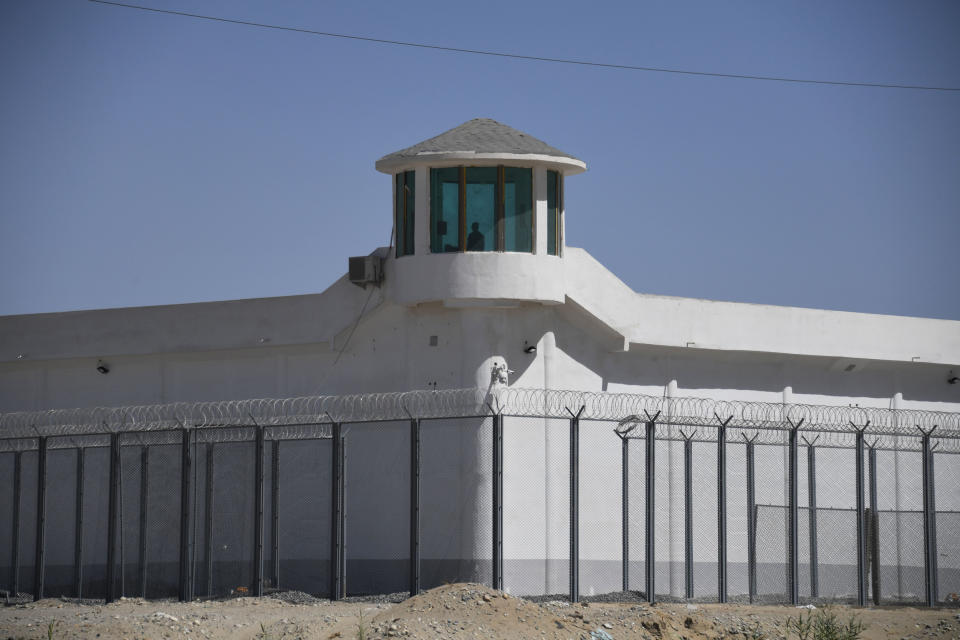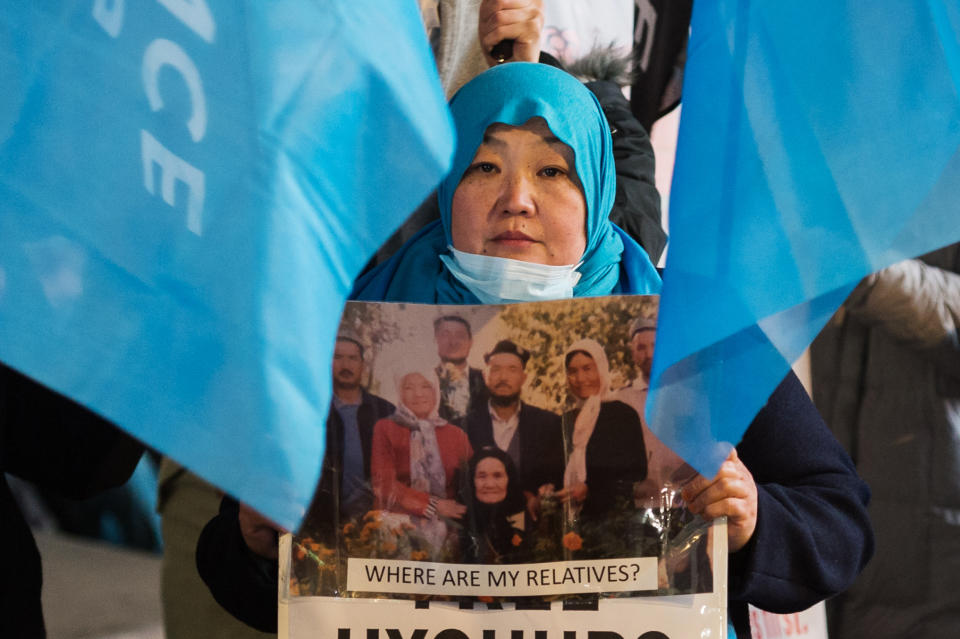China is hunting down Uyghurs around the world with help from some surprising countries
- Oops!Something went wrong.Please try again later.
The Chinese government is not only mistreating Uyghurs within China's borders, it is hunting them down abroad — with help from countries like Saudi Arabia, Egypt and the United Arab Emirates — to clamp down on criticism of Beijing’s repression of Muslim minorities.
The scale of the Chinese Ministry of State Security’s efforts to harass, detain and extradite Uyghurs from around the world, and the cooperation it is getting from governments in the Middle East and North Africa, is described in unprecedented detail in a new report, “Great Wall of Steel,” by the Woodrow Wilson Center’s Kissinger Institute on China and the United States.
More than 5,500 Uyghurs outside of China have been targeted by Beijing, hit with cyberattacks and threats to family members who remain in China, and more than 1,500 Uyghurs have been detained or forced to return to China to face imprisonment and torture in police custody, according to the report.
“It is the first major study to place the Xinjiang humanitarian crisis in a global context, showing the international dimension of Beijing’s campaign to suppress the Uyghurs,” said the report’s author, Bradley Jardine, a Schwartzman fellow at the Wilson Center and director of research at the Oxus Society for Central Asian Affairs.
The detentions and forced repatriations to China are ongoing.
On April 13, Amnesty International reported that Saudi Arabia was preparing to deport a Uyghur woman and her 13-year-old daughter to China, where they would risk being detained in the vast web of “re-education camps” in western China’s Xinjiang Province. The girl’s father and another Uyghur, a Muslim scholar, are also detained in the kingdom. It is unclear if any of them were formally charged.
Anthropologist Adrian Zenz, who has studied and documented Beijing’s systematic repression of Uyghurs, says Beijing is using economic might and gifts of infrastructure projects — its global Belt and Road initiative — to pressure countries, including those with majority Muslim populations that might be sympathetic to the Uyghurs’ plight.
“The Chinese are quite scared of what Muslim populations think of their treatment of the Uyghurs and have exerted particular effort in influencing government and popular opinion in those countries,” said Zenz, who is a senior fellow in China studies at the Victims of Communism Memorial Foundation, a nonprofit based in Washington.
Camps for Uyghurs
Chinese authorities in Xinjiang began rounding up women and men in 2017 — largely Muslims from the Uyghur, Kazakh and Kyrgyz ethnic minorities — and detaining them in camps designed to rid them of terrorist or extremist leanings.

From 1 million to 2 million Uyghurs and members of other minorities from Xinjiang are believed to be held in the camps, where they are forced to study Marxism, renounce their religion, work in factories and face abuse, according to human rights groups and first-hand accounts. Beijing says these “re-education camps” provide vocational training and are necessary to fight extremism. The Chinese Embassy in Washington did not respond to a request for comment on this article.
According to the report, what scholars call “transnational repression,” ranging from online harassment to detention and extradition, has taken place in 44 countries, and Uyghurs have been threatened and intimidated in United States, Japan and across the European Union. More than 1,500 detentions and forced returns to China have occurred since 1997, more than 1,300 of them since 2014.
The report breaks down the repression into three distinct stages. From 1997 to 2007, 89 Uyghurs were detained or deported by local security services primarily in South and Central Asia. In the second phase, from 2008 to 2013, 126 Uyghurs were targeted primarily in Southeast Asia. And in the ongoing third phase, from 2014 to present, 1,364 Uyghurs have been detained, extradited or rendered from 18 countries concentrated in the Middle East and North Africa.
The report is based on a database built by Jardine in partnership with the Uyghur Human Rights Project and the Oxus Society for Central Asian Affairs called "China’s Transnational Repression of Uyghurs Dataset." Researchers culled news reports and government documents and conducted interviews with Uyghurs to compile the comprehensive list of documented instances of persecution outside of China. Reporting by Jardine and NBC News indicates that the scale is likely more extensive than is officially reported.
The database includes 424 cases of Uyghurs forcibly returned to China, most since 2014, when the Chinese Communist Party launched its own “War on Terror.”
China’s secret service has relied on foreign governments in many cases and Interpol in some cases to help repatriate Uyghurs they wish to control, according to the report.
“This changes the Uyghur story by making clear that China is not only mistreating Uyghurs within China’s borders, but is also pursuing them internationally, through both legal and illegal channels, on a large scale,” said Robert Daly, director of the Wilson Center’s Kissinger Institute. “China is pursuing, harassing, and detaining Chinese Uyghurs around the world and returning them to China for punishment whenever possible.”
Many of the Uyghurs in the database have been detained and sent back to China without being charged with a crime, while others have faced accusations ranging from missing passports and visas to terrorism. Some were accused of making or associating with individuals who have made political statements critical of Beijing’s repressive policies in Xinjiang, while others were deported merely for having studied religion abroad. The database includes 60 documented cases of Uyghurs accused of promoting or partaking in separatism or terrorism or being linked to an extremist group.
In Morocco, a Uyghur human rights activist and journalist critical of China’s policies remains imprisoned following an Interpol red notice against him issued at Beijing’s request. While Interpol later withdrew its notice citing its bylaws forbidding persecution on political, religious or ethnic grounds, a Moroccan court approved an extradition request by China in 2021.
In a statement to NBC News, an Interpol spokesperson said that a “specialized task force” reviews every red notice request to ensure compliance with the organization’s rules, taking into account information available at the time of publication, and can re-examine any notice if new information emerges, as it did in the Morocco case. “[Interpol’s] General Secretariat is constantly reviewing, assessing and updating its procedures to ensure the greatest level of integrity in the system, and trust in its work,” the spokesperson said.

Saudi Arabia, which appears on China’s list of “suspicious” countries for Uyghurs to travel to, has increasingly cooperated with Beijing. Saudi authorities have deported at least six Uyghurs to China in the last four years who were either making pilgrimages to Mecca or living in the country legally, according to the report.
“This is complete callousness [on the part of Saudi Arabia] knowing what will happen to these Uyghurs when they get to China,” Zenz said. “The Chinese government wants to cleanse Uyghurs worldwide so that there are no pockets of Uyghurness outside of China’s borders that are not in line with Beijing’s narrative.”
In 2017 Egyptian police rounded up Uyghur students at a university in Cairo and deported them to China and elsewhere in the Middle East. Some escaped to Dubai only to face detention there, according to the report.
“I have learned from interviews with Uyghur sources in the UAE that Chinese police coordinated the Egypt crackdowns with Dubai. Uyghur students who attempted to flee to the UAE from Egypt were picked up as a part of this coordination,” Jardine wrote in the report.
In a statement emailed to NBC News, a government spokesperson said the UAE government “categorically rejects” the allegations, calling them “baseless.”
“The UAE follows all recognized global norms and procedures established by international organizations such as Interpol in the detainment, interrogation, and transfer of fugitives sought by foreign governments.”
In 2020, Saudi Arabia, Egypt and the UAE joined 42 other countries in signing a letter supporting China’s campaign of mass detention in the Xinjiang region.
The embassies of Saudi Arabia, Egypt, and Morocco did not respond to requests for comment.

